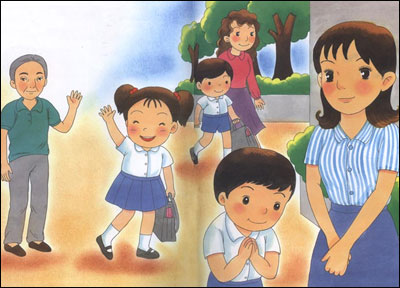Gratitude in the Cultivation of Virtue
Gratitude in the Cultivation of Virtue
It is difficult for a person to have the right thought to persistently cultivate good deeds and virtues for themselves. But more difficult than that is to keep one’s encouragement for the cultivation of good deeds going indefinitely, not to backslide or give up in the middle of the course. It is the nature of cultivating virtue that one must always come up against obstacles and hindrances, sometimes problems from our immediate surroundings, sometimes inner problems from the influence of the defilements. In order to survive and not to succumb to those hardships or obstacles, we need to cultivate the virtue of gratitude.
When we go to school to study, sometimes, it is so difficult that many times we want to give up. Some friends try to keep us away from studying, but we have to recognize the gratitude of the parents that they parents also place their hopes on us, hoping that we grow up with prosperity and progress in life. When we realize that, the gratitude will arise, we will have the strength and the inspiration No matter how exhausted we are, we still keep striving, studying harder to get good grades. Never fall into the unwholesome path to destroy the reputation of the family and never disappoint the parents or the teachers.
Even among the Dhamma practitioners, who earnestly perform the duties of spreading the Buddha’s teachings; they always encounter conflicts with others. Different people have a different point of view. They all have good intention to work, but their ability is different. Sometimes people post their attitude toward others, thinking that “I don’t care that you are the top, I am also as good as you”, so they are not compromised to each other. Conflicts arise because we cannot overcome defilements. Therefore, if we cannot control the mid, conflicts can arise. When they are outside to spread the Buddha teachings, they encounter many people who do not understand, going against them, cursing, or insulting them. Therefore, many of the Dhamma practitioners and the persons who are spreading Dhamma and devoting themselves to helping society, become fed up, succumb or give up in the middle of the middle of their courses.

Never fall into the unwholesome path to destroy the reputation of the family and never disappoint the parents or the teachers.
If the persons who have given up still have the virtue of gratitude in mind, whenever they are discouraged or exhausted, they cab keep themselves on track by reminding themselves of their gratitude to the Lord Buddha. Remembering how fortunate they are to learn the Dhamma teaching of the Buddha, learning how to cultivate good deeds and how to live a wholesome life. The Buddha had dedicated His life to attain enlightenment of the “Four Noble Truth” that the Buddha’s difficulties and the great effort in pursuing the perfections 4 x incalculable and ten thousand kalpas.
The duration of one kalpa is measured by assuming that there is one square mountain, 16 kilometers in width and 16 kilometers in length, and 16 kilometers in width and 16 kilometers in length, and 16 kilometers in height. In every 100 years an angel will come once to rub the mountain with a soft and thin celestial cloth once. Until this mountain smoothes down to the same level of the ground, it will equal to “l kalpa”
“l incalculabl is a period equal to 10,140 kalpas (one followed by 140 zeros). We also have to recognize the gratitude of all the Dhamma teachers who had earnestly passed on the Buddha’s teaching until this present day. If we can appreciate this, all the discouragement and tiredness will disappear, not even afraid of death, we will have more strength to self – betterment.
“l incalculabl is a period equal to 10,140 kalpas (one followed by 140 zeros). We also have to recognize the gratitude of all the Dhamma teachers who had earnestly passed on the Buddha’s teaching until this present day. If we can appreciate this, all the discouragement and tiredness will disappear, not even afraid of death, we will have more strength to self- betterment.
Gratiude is one of the most important virtues that will inspire us to develop higher virtues in the future.
Enables us to maintain the existing virtues within.
The Benefits of Being Grateful
1. Enables us to maintain the existing virtues within.
2. Enables us to cultivate more virtues.
3. Allows us to be mindful and not reckless.
4. Engenders shame of unwholesomeness and fear of the consequence of unwholesomeness.
5. Engenders patience.
6. Keeps the mind pure and optimistic.
7. Being admired by good people.
8. Attracts good people to associate with us.
9. Being supported by people and angels.
10. Be free from demerit retribution and danger.
11. Facilitates us to achieve good things or outcome.
12. Enables us to become enlightened and attain Nirvana.
Meditation - Related Articles
" />
" />








